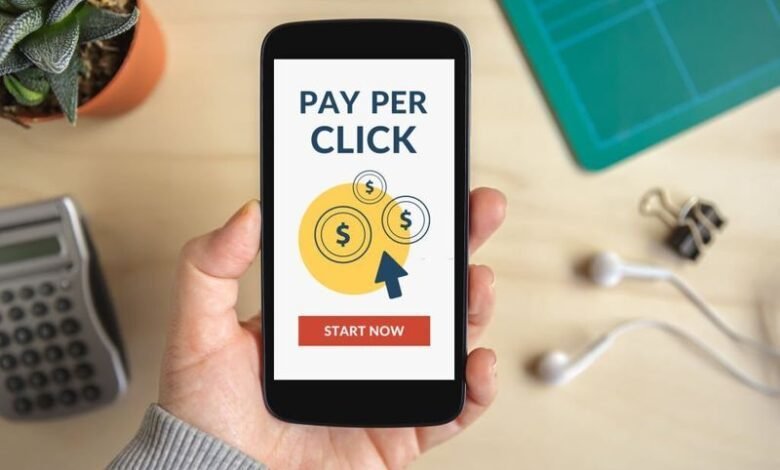Pay-Per-Click Advertising Isn’t Going Anywhere: Hone Your Skills to Become a PPC Expert

Most managers and small business owners are familiar with SEO, but how much do you know about search engine marketing (SEM)? SEM is a critical investment for any business in the digital age.
SEM often uses pay-per-click (PPC) advertising. PPC marketing is expanding and most businesses have been devoting more and more resources to planning and implicating a PPC campaign. But to do this, they need a PPC expert on their team.
Becoming a PPC marketing expert is easy for those familiar with SEO and paid digital advertising, such as through Google Ads. With this guide, we show you how you can bring a profitable PPC campaign to your organization.
The Basics: What Exactly Is PPC Marketing?
Pay-per-click (PPC) marketing means a company pays every time someone on a search engine clicks their link. Essentially, it is a paid version of SEO.
While SEO can help you capture an audience organically, PPC can help you broaden your reach. PPC marketing comes in a few different forms. These include, but are not limited to:
- Display marketing
- Social media marketing
- Search engine advertising
Search engine advertising is probably the most important for you to know, as it is currently the most popular form of PPC marketing.
What Is Search Engine Advertising?
In order to boost their reach, marketers will bid on links that include keywords relevant to their business. Then, whenever someone visits the link, the company will pay a fee to the search engine itself. This is search engine marketing, and it is a useful central strategy for many PPC campaigns.
SEO alone won’t always trigger the kind of reach necessary to keep businesses growing. But, according to The Content Marketing Institute, PPC marketing can offer an almost immediate return on investment.
But how do you go about preparing a PPC campaign? Well, there are a few places to start.
1. Utilize Google Adwords
Before you begin any PPC advertising, you need the right tools to manage your campaign. While Google Adwords isn’t the only platform available, it is, by and large, the most popular. All the best marketing experts have intense familiarity with it.
Using Google Adwords, you can create ads that Google will then display to users. They’ll only display your ads if they match up to the user’s search query. This helps raise the likelihood that users will engage with it.
Google selects which ads to feature on the front page of a query based on a few criteria. These include:
- Search keywords
- The company’s CPC bids
- The company’s quality score
Before you create your ads, however, it’s important to check the quality of your landing pages. These ads should direct users to relevant, engaging content that will turn them from visitors into customers.
2. Conduct Keyword Research
Just like any good SEO campaign, PPC campaigns should begin with thorough keyword research. In fact, it is key to build your entire campaign around these keywords.
Your keywords will need to change over time. Unlike SEO, you can’t simply create more content with PPC marketing, so you’ll have to adjust based on results.
Start your keyword brainstorm by reviewing your landing pages. This can help inform you of the kind of content your ideal audience is looking for.
There are three main categories you should keep in mind when brainstorming your keywords. These are:
- Brand terms
- Generic terms
- Related terms
The Keyword Categories
Brand terms are those explicitly related to your business, such as your company name or specific products. Generic terms will omit the official company names and instead focus on the general products or services themselves.
Related terms are those terms that are most likely to lead people to your site. They don’t have to be specifically related to a product or service but instead focus on the customers’ wants or needs.
There is also a fourth keyword category you should be aware of competitor terms. While you can bid on competitor terms, they’re usually much more expensive. You will have to consider carefully whether it is a worthwhile investment to focus on your competitor in your PPC campaign.
3. Broaden Your Keyword List
Once you have decided on your keywords, don’t forget to add variations. Synonyms and other common queries related to your keywords will attract a wider audience.
One way to expand your keyword list is by using a PPC Keyword Concatenation Tool.
A PPC keyword concatenation tool is something a digital marketing service will use to categorize and separate common terms that your customers will search for. These terms are then placed into columns where they can be mixed and matched.
The keyword tool will use this column to compile a list of all the possible combinations of your common keywords. This helps you cover more potential search terms that your customers will be looking for.
4. Don’t Neglect Voice Search
Typing into the Google search bar isn’t the only way people find things anymore. Voice search is continuously increasing in popularity.
That’s why it’s important for PPC experts not to disregard voice search when preparing their campaigns. We type differently than we speak, which means Siri may turn up different keywords than the Google search bar.
While you might type “Best bars LA,” into Google, you’ll probably ask Siri something like “Where are the coolest bars in LA?”
For your PPC campaign to be effective, you need to keep keywords for both typing and voice search in mind.
5. Monitor Keyword Success to Refine Your List
An important part of an effective PPC campaign is knowing which keywords are actually successful. You want to keep a refined list so you aren’t wasting any resources on played-out keywords that don’t generate results.
A keyword research tool can help you monitor important metrics for your keyword searches. You can also use a keyword research tool to monitor your keywords’ competition ranks as determined by Google Adwords.
The competition ranks determine how much a keyword will cost. Keywords with higher competition ranks will cost more.
To improve the cost efficiency of your campaign, you’ll want to look for keywords with a low competition rank, but a high search volume.
6. Create a List of Negative Keywords
Negative keywords are pivotal to keeping your campaign cost-effective. By providing Google with a list of negative keywords, you are telling them that you do not want your ads appearing in those results.
These negative keywords are important for making sure your ads don’t appear to irrelevant customers. Not only can this turn off customers, but it can also end up costing you.
The best negative keywords to use are those that are similar to your product or service, but not exactly relevant. Check your search query reports to discover what people are searching for that leads them to your site.
If you find terms on this report that don’t match your product or service, add them to your negative keywords list.
Creating a Campaign Like a True PPC Expert
PPC campaigns are ongoing systems. In fact, continual monitoring and adjustment is the best way to ensure your PPC campaign generates a successful ROI.
The best PPC marketing agency will pay attention to the performance of its keywords. Use this data to adjust and rearrange in order to boost your conversion rates. This data can also help inform your decision on how you’d like to bid on search queries with Google.
Search queries are different from keywords. Keywords are what you use to optimize your content. Search queries, on the other hand, are what your customers are typing into the search engine.
In order to turn keywords into search queries, you need to use keyword matching.
YOU MIGHT ALSO LIKE:
What Are the Benefits of Hiring the Best Digital Marketing Agency?
Keyword Matching
When using Adwords to build your campaign, there are four match types for you to choose from. These are:
- Broad match
- Modified broad match
- Phrase match
- Exact match
A broad match will match your ad to any queries that are even remotely related. The search queries don’t even need to include one of your keywords.
A modified broad match is similar, but a bit more restrictive. Modified broad matches will only include your ad if the search query includes one of the keywords you have bid on.
Phrase matches and exact matches are the most restrictive types of keyword matching. With either of these options, Google will only include your ad if the exact phrase from one of your keywords is in the search query.
Phrase matches are a bit more lenient than exact matches. They will include queries that have words either before or after the phrase. With an exact match, the phrase and only the phrase will be in the search query.
Writing Your Ads
Once you’ve gathered your list of keywords and chosen your matching time, it’s time to finally write your text ad.
Your ad is your first impression. It is your chance to engage the customer and get them to interact with your content.
A PPC text ad includes:
- Headline
- URL
- Description
Google will bold the search query terms within your ad, making users more likely to click on them. Be sure to include your carefully selected keywords somewhere in your headline.
You should use your description to entice readers into clicking the link. Your ad should showcase the benefits of looking at your website. Including a call to action in your description is a great way to motivate users.
Google also gives you the option to purchase ad extensions, which allow you to include your contact information, company’s location, and pictures in your ad.
Optimal PPC Campaign Management
You may set up your campaign using all the top tips, but to be truly successful you need to learn how to manage your campaign just as well as a top pay-per-click advertising agency.
In order to effectively manage a campaign, you need to be familiar with the most important metrics for campaign monitoring.
Quality Score
Google will assign you a quality score based on your ads and keywords. Your quality score makes a big impact when it comes time for Google to rank your ad. Quality score also determines how much Google will charge you each time someone clicks on your ad.
An online advertising academy can help you learn more about how to improve your quality score and the impacts it can have.
But, some key factors that influence your quality score include:
- CTR, or click-through-rate
- Ad text
- Landing pages
- Your Adwords history
Understanding CTR
CTR takes the number of clicks you receive on an ad and measures them against the number of times people have seen your ad. Every time someone sees your ad, it is called an impression.
Google expresses a CTR as a percentage. They get this number by dividing your ad’s total number of clicks by its total number of impressions.
A good CTR will depend on which industry you’re in.
Cost-Per-Click vs Cost-Per-Acquisition
The cost-per-click (CPC) is the price of every click on your PPC campaign. Google calculates this by dividing your Competitor AdRank by Quality Score and adding 0.01.
Cost-per-acquisition (CPA), however, is the cost of each individual successful conversion. This should always be higher than your CPC because not every visitor to your webpage becomes a customer.
When setting up your PPC campaign, you’ll be able to define what exactly constitutes a conversion.
Your Quality Score will affect both your CPC and your CPA. As you monitor your PPC campaign, you should continuously aim for a high-quality score and a low CPA.
Jump Into the World of a PPC Expert
Now that you know the basics of a successful PPC campaign, you’re almost ready to declare yourself a PPC expert. But, don’t get discouraged if things don’t work out perfectly right away. It takes time and practice to get familiar with the world of PPC marketing.
If you’re looking to learn more about digital marketing, check out our Business section. There, you’ll find all the tips you need to become a shark in your industry.






